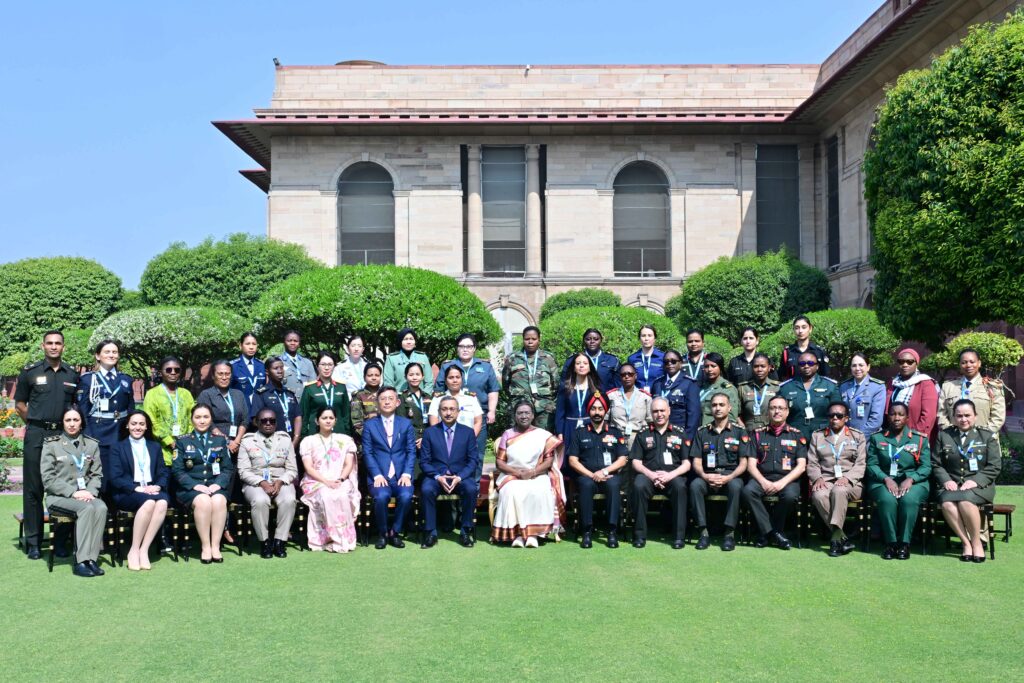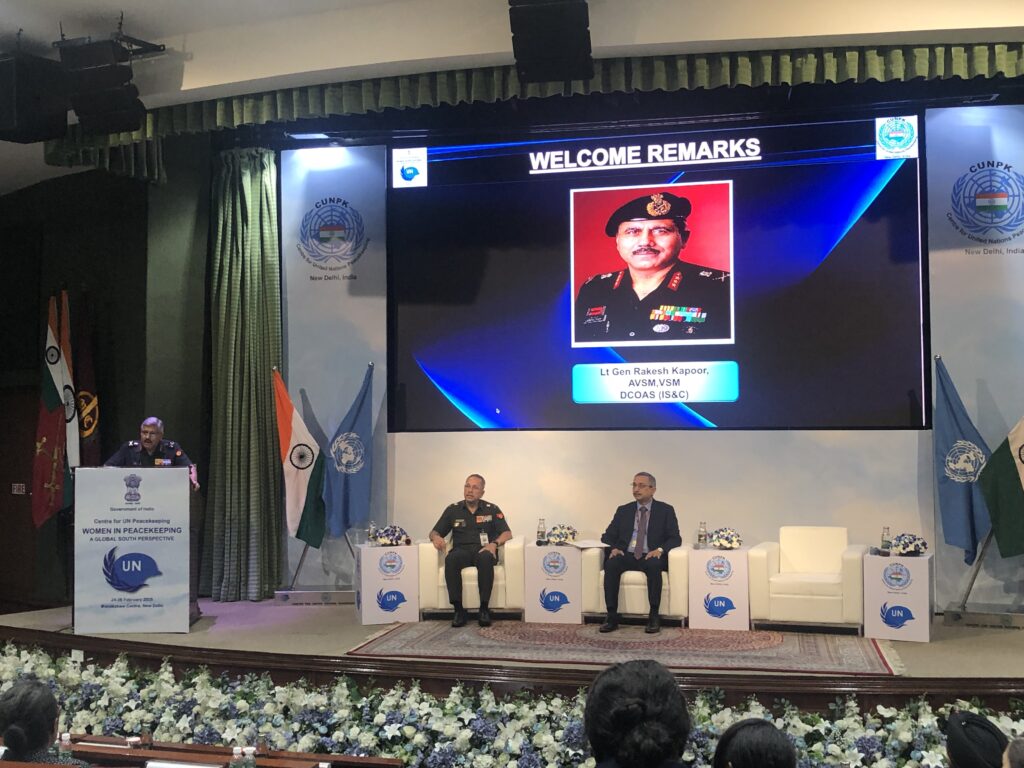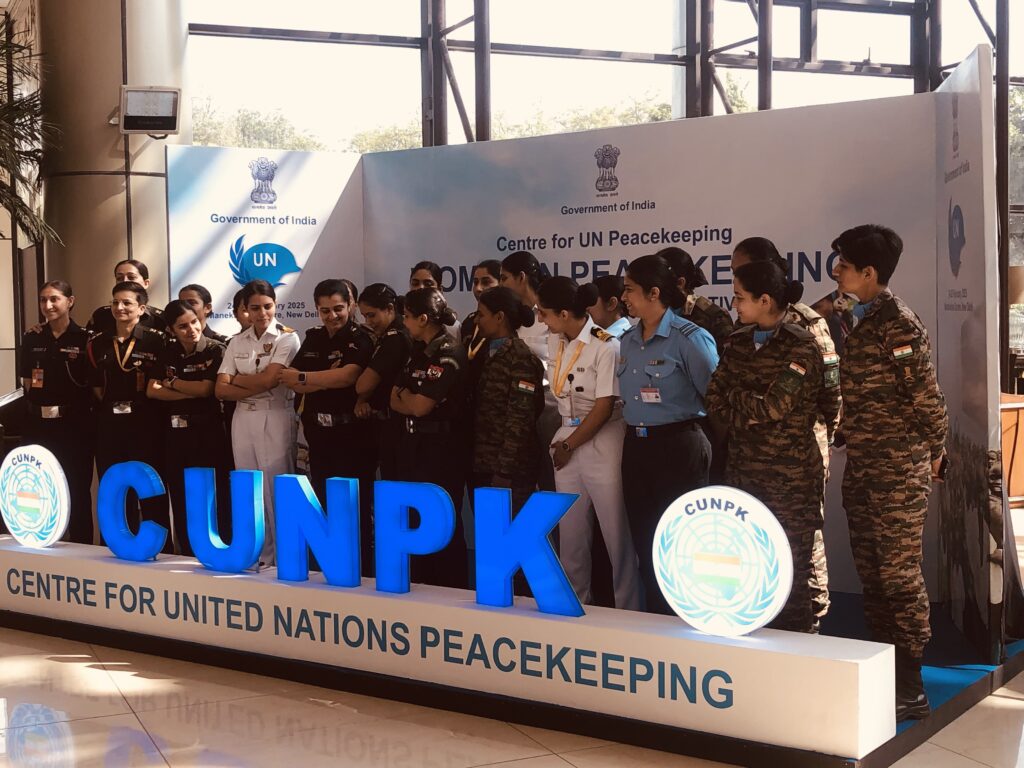By: Suman Sharma

Women armed forces officers from 35 nations of the Global South are in New Delhi to participate in a first ever conference hosted by India, themed “Women in Peacekeeping: A Global South Perspective”, being organised by the Ministry of External Affairs MEA), in partnership with the Ministry of Defence (MoD) and Centre for United Nations Peacekeeping (CUNPK). This year marks 25 years since the adoption of the UN Security Council Resolution 1325, which deals with Women, Peace, and Security.
The conference is aimed at bringing together women officials from the Global South to discuss issues of contemporary relevance to peacekeeping and the various challenges being faced by peacekeeping missions, and reflect the progress made so far but also reaffirm the collective commitment of nations towards enhancing and empowering the role of women in peace and security.
The delegates met President of India, Smt Droupadi Murmu, who said that the presence of women in a peacekeeping mission makes it more diverse and inclusive. “Women peacekeepers often have greater access to local communities and can serve as role models for women and children. They are better equipped to address gender-based violence, build trust, and promote dialogue,” further adding that, “Peacekeeping missions with a higher percentage of female personnel have been more effective in reducing violence and achieving long-lasting peace agreements. It is therefore essential that we induct more women in UN peacekeeping missions,” said the President of India.

India has a proud history of contribution to UN peacekeeping, with over 2,90,000 India peacekeepers having served in more than 50 UN peacekeeping missions, since the 1950s. Today, there are over 5000 Indian peacekeepers in nine active missions, deployed in often hostile conditions, for the cause of international peace and security.
Exhibiting the highest traditions of professionalism and conduct, India has been at the forefront of deploying women in peacekeeping roles, both military and police. The first chapter of this journey began in the 1960s, when Indian women, as medical officers, were deployed in Congo. In 2007, India became the first nation to deploy an all-women Formed Police Unit in Liberia—a pioneering initiative that had an indelible impact on both the host community and the broader UN framework. Over the years, this initiative empowered Liberian women, increasing their participation in security sectors. Today, India proudly continues this legacy, with over 150 women peacekeepers deployed across six critical missions, which are the Democratic Republic of Congo, South Sudan, Lebanon, Golan Heights, Western Sahara, and Abyei.
External Affairs Minister Dr S Jaishankar in his address mentioned about India’s singular focus towards the advancement of global peace and security, in the pursuit of which nearly 180 Indian peacekeepers had lost their lives. “One such individual, Captain Gurbachan Singh Salaria, posthumously honored with the Param Vir Chakra for his courage during the UN Mission in Congo, remains a beacon of inspiration. His is the singular case of this highest honor being awarded for operations conducted abroad,” said the EAM.

India has produced a multitude of exemplary women peacekeepers who have inspired others globally. Dr. Kiran Bedi, who served as the first woman UN Police Advisor, Major Suman Gawani and Major Radhika Sen, recipients of the UN Military Gender Advocate Award in 2019 and 2023 respectively, and Ms. Seema Dhundia, who led the first all-women Formed Police Unit in Liberia, are a few examples who have blazed a trail for others to follow.
The two-day conference in New Delhi is likely to play a crucial role in shaping the outcomes of two significant events due to take place this year, which are the Peacekeeping Ministerial in Berlin and the Peacebuilding Architecture Review in New York.
As explained by some of the visiting peacekeepers during interactions, that women peacekeepers often have unique access to local communities, acting as role models for women in conflict zones. Training courses tailored to include modules sensitising peacekeepers to issues related to women will enhance the effectiveness of peace operations.
Colonel Dilya of Kazakhstan Army has worked in Lebanon under UNIFIL as part of CIMIC (civil military cooperation). She was under the operational command of an Italian contingent. “My job was to interact with civil society, local administration and the military leadership in Lebanon and help in the repair and reconstruction work of roads, schools, hospitals and Churches, which were ravaged in war”, added Col Dilya.
Moroccan Army’s Colonel Hind Jirari has done a one-year tenure in South Sudan as part of Intelligence, before moving back to headquarters in Juba, the capital of South Sudan, where she was assigned an HRD (human resource development) role. Jirari says, “I have never faced any issues during my posting, in fact my knowledge of Arabic helped me in dispensing my duties in South Sudan, as the language used there is a certain dialect of Arabic.”
Tunisia’s Major R Salhi has been trained in Rwanda and is awaiting her posting to a UN mission. She is a specialist in general services.


Thank you for sharing. I am working on women officers of the Indian Air Force..